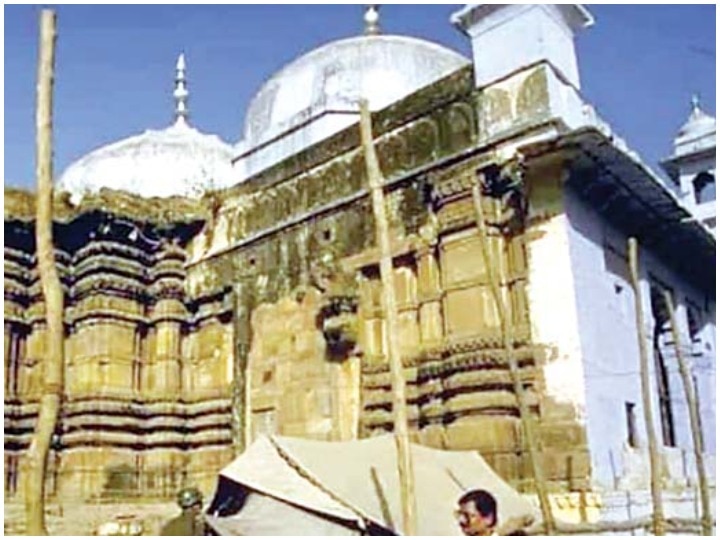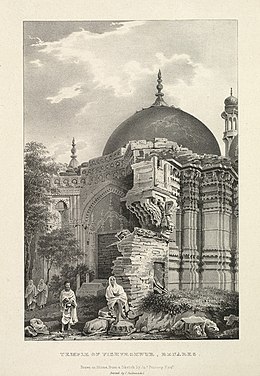Shivling found in Gyanvapi Mosque in Varanasi: The “Shivling” (symbol of Lord Shiva) has been found in the pond of the Gyanvapi mosque near Kashi Vishwanath Temple in Varanasi. Water was drained from the pond and a “Shivling” was found, claimed Subhash Nandan Chaturvedi, the lawyer representing a group of Hindu women.

The pond, used for “Wazoo” or purification rituals before namaaz, must be sealed, the petitioners requested the court. The court accepted the plea and ordered the Varanasi District Magistrate to ensure that the pond was closed to the public. The court also said the administration, police and security personnel must make sure no one entered the sealed area. Shivling was discovered after the water inside a pond like well, which is used as Wuzukhana by Muslims, was pumped out.
The court also said that the responsibility for supervising the sealing of the place will be of the UP director general of police (DGP) and the UP chief secretary (Administration).
The court had ordered videographic survey of the Kashi Vishwanath Temple-Gyanvapi Mosque complex to find whether it was earlier temple or not. The vdeo survey ended on 16th May 2022.
What is a Wuzukhana?
A Wuzukhana is a place where the people who offer Namaz wash their hands and feet prior to the offering. It has significance in Islam as it is a place where dirt from the body is washed out before offering Namaz. Basically, Wuzukhana is derived from two words – Wuzu and Khana. Wuzu means washing parts of the body before offering Namaz and Khana is the place where Wuzu is performed.
Wuzu is an Islamic process for washing bodily parts, a sort of ceremonial purification or ablution. Wuzu is sometimes interpreted as ‘partial ablution,’ as opposed to ghusl, which is ‘full ablution,’ in which the entire body is bathed.
What is The Gyanvapi Mosque?
The Gyanvapi Mosque dispute is much like the Ayodhya Temple-Mosque issue, which was resolved in 2019. The Gyanvapi Mosque is located in Banaras, Uttar Pradesh, India near Kashi Vishwanath Temple. It was constructed on the site of an older Shiva temple which had been demolished by Aurangzeb in 1669. The name of the mosque is derived from an adjoining well, the Gyan Vapi (“Well of Knowledge”). Legends hold that Shiva had dug it himself to cool the lingam.

Demolition of Gyanvapi Mosque
The site originally had a Vishweshwar temple, established by Todar Mal in conjunction with Narayana Bhatta – the head of Banaras’s most-famous Brahmin family – sometime around late sixteenth century.

Vir Singh Deo Bundela, a close associate of Jahangir, was a probable patron in the early seventeenth century and refurbished the temple to some extent.
The original wall of the now demolished temple still stands in the mosque. Sometime around 1669, Aurangzeb ordered the demolition of the temple and commissioned the construction of Gyan Vapi mosque, in its place.
Gyanvapi Mosque Dispute
In 1991, a bunch of petitioners filed the case in the court contending that the mosque was built by the Mughal emperor Aurangzeb after demolishing a temple in 1669.
They demand that the mosque be removed, and the land be given to the Hindus. The matter remained in abeyance till now. In 2019, an advocate approached the Allahabad High Court demanding that the complex be surveyed by the Archeological Survey of India.
Last April, five people petitioned that they should be allowed to perform daily darshan, pooja and other rituals of Maa Shringar Gauri and other deities within the old temple complex. A civil judge had appointed the commissioner Ajay Mishra for the same.
The litigants claimed about the existence of an image of the Goddess on the western wall of the mosque situated adjacent to the Kashi Vishwanath temple. They demanded that the caretakers of the mosques allow daily darshan, prayer, aarti, bhog and other rituals without any restrictions, obstacle and hindrance.
Now, the varanasi court has ordered that the video inspection should be completed by May 17. Anjuman Intezamia Mosque Committee said that the commissioner was biased but the court refused to remove Court commissioner Ajay Mishra and ordered that the video inspection of the Gyanvapi mosque, located next to the Kashi Vishwanath temple, will continue.